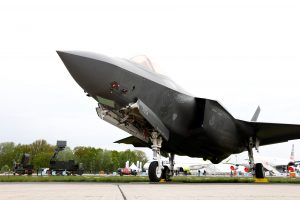The intricate dance between Washington, Athens, and Ankara around the sale of new fighter jets and Sweden’s potential NATO membership remain a complex challenge for American diplomacy. While the situation may seem like a modern-day Gordian knot, it seems unlikely that Secretary of State Anthony Blinken will take a page out of Alexander the Great’s book and unsheathe his sword to swiftly cut through this entanglement.
In this diplomatic triangle, Washington is cautiously orchestrating its moves in order to find a way to bring all the pieces of this puzzle together, while avoiding any undesirable consequences. As U.S. looks to carefully move this process forward, Greece is being asked once again to exhibit patience as it endures further delays in its request for F-35 fighter jets due to the tug of war between Washington and Ankara over Sweden’s NATO bid.
Mr. Blinken’s recent meeting with Greek Prime Minister Kyriakos Mitsotakis highlighted the urgency of this matter, recognizing that delays undermine the credibility of the U.S. and strain relations with a key ally in a critical region. Despite these setbacks, Washington has again given Turkey more time on the issue of Sweden’s NATO membership, hoping that Ankara will ultimately ratify Sweden’s bid to join the Transatlantic Alliance.
This decision is justified by the belief that the potential benefits of a solution will outweigh the costs and complications arising from any further delays in the F-35 issue. This time, however, the clock is ticking, as a lack of progress on this front threatens to overshadow the upcoming U.S.-Greece Strategic Dialogue in Washington, DC this coming February.
The optimistic scenario envisioned by Washington involves the approval of Sweden’s NATO membership within this extended but limited timeframe, leading to simultaneous notifications to Congress for the sale of F-35s to Greece and F-16s to Turkey. If successful, this solution aims to safeguard American interests while addressing Greek security concerns.
In addition to the acceptance of Sweden to NATO, Congress has put the safeguarding of Greek sovereignty in the Aegean as a second condition for the sale of F-16s to Turkey. This safety net aims to specifically address the problem of Turkish overflights. Aside from challenging Greek airspace and sovereignty, for decades Turkish jets have provoked Greece in the Aegean, often flying in armed formations over inhabited islands, with these incursions reaching alarming levels over the past years.
The security guarantees, however, are not designed to address the problem of Turkey’s violations of Greek airspace. Greece claims an airspace that extends up to 10 nautical miles and a territorial sea of up to 6 nautical miles, but the U.S. does not recognize the discrepancy between the extent of airspace and territorial waters in the Aegean. Under the UN Convention on the Law of the Sea, Greece reserves the right to extend its territorial sea to 12 nautical miles, but at a moment of its own choosing. Turkey, however, maintains a “casus belli” – or a threat of war – against Greece should it exercise this sovereign right.
The “Menendez package,” an agreement reached in NATO’s Vilnius Summit, attempts to assure Greece that the potential sale of F-16s to Turkey will not pose a threat to its national security. The package, thus, shields Greece by offering a defensive edge and creating a political deterrence that will discourage Turkish aggression.
According to this plan, Greece will receive financial assistance for the F-35s purchase through the Foreign Military Financing program, alongside the provision of additional defense equipment at no cost. At the same time, Anthony Blinken is expected to send letters to both Prime Minister Kyriakos Mitsotakis and Congress. The first letter will diplomatically assure Greece that Turkey’s new F-16s will not be used to violate Greek sovereignty. The second one would describe an informal oversight mechanism that would halt or cease the F-16 program if Turkey falls back into its bad habits.
For the moment, the strategic linkage of the F-35 delay with the F-16 sale provides the Biden administration with leverage over both Turkey and Congress. The message to Turkey is clear, as it knows that there is an imminent risk to fall behind its historical rival, Greece, which will soon acquire the most advanced U.S. aircraft. At the same time, it discourages Congress from imposing additional conditions on the F-16 sale, since further complications will result in more delays on Greece’s deal as well.
The interconnectedness of these issues serves as a tactical move, providing the U.S. with a powerful negotiating tool and influencing the delicate diplomatic dance in the region. The question remains if this short-term strategy will have the desired effect.




